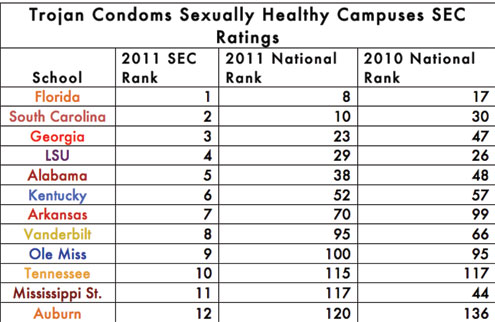 Paris need not worry about Tuscaloosa usurping its claim to the title of “City of Love” just yet, but the results of a recent study show the University of Alabama is demonstrating significant improvement in sexual health.
Paris need not worry about Tuscaloosa usurping its claim to the title of “City of Love” just yet, but the results of a recent study show the University of Alabama is demonstrating significant improvement in sexual health.
The Trojan Sexual Health Report Card, which annually measures the availability of sexual health resources at over 140 college campuses nationwide, ranked the University No. 38 in the country in this year’s study, up from No. 48 in 2010.
Alabama finished fifth in the SEC. The University couldn’t quite measure up to Florida (first in the SEC, eighth overall) but handily outperformed Auburn (12th, 120th).
Trojan recruited Bert Sperling, known for his work with BestPlaces.net, to head the research for the Report Card.
Sperling, who has directed the study since 2006, pointed to 13 specific criteria by which each school was graded, including contraceptive availability, sources of anonymous advice for students, sexual assault programs and peer support groups.
“We were really looking at the availability of sexual health information,” he said. “As well as the kind of information that is available, specifically from the schools’ student health centers.”
According to Sperling, researchers began by contacting administrators and health center officials by phone and through a two-page questionnaire. These evaluations were followed by investigations of health centers’ websites from an “average student’s point of view.” He said no students were interviewed for the study to respect privacy.
The results of the self-report methods and website inspection were combined to assign schools a 1-10 rating for each of the 13 criteria. The average of these scores determined each university’s sexual health “GPA.”
Sperling attributed the University’s 10-point jump in the standings to the improved availability of information about contraceptives on the Student Health Center website. He said that student peer groups also play a prominent role in the promotion of sexual wellness and awareness at Alabama.
Though he commended the University’s positive performance, Sperling also wanted to convey that Alabama has plenty of room for improvement.
“The lowest score you got was on the anonymous advice section,” he said. “It’s a very important thing to have some sort of anonymous, public forum for students to ask questions and get answers.”
The availability of information regarding sexual assault was another of the University’s key weaknesses. Sperling indicated the need for the clearer display of the sexual violence hotline number on the SHC website.
Margaret Garner, Assistant Dean for Health Education and Outreach in the College of Community Health Sciences and Director of Health Promotion and Wellness at the SHC, felt that researchers “may not be taking the time to delve deeply enough into the availability of resources” to University students.
“Students have access to sexual health information from places other than websites,” she said. “The SHC organizes activities throughout the year to engage students in thinking about and practicing sexual health.”
In addition to the resources available on the SHC website, Garner pointed to the SHC’s Health Hut program as one of the key tools helping to bring the message of sexual wellness to students.
Elle Shaaban-Magaña, Director of the Women’s Resource Center, said in an emailed statement that the WRC “responds to crisis involving interpersonal violence 24 hours a day.”
“[Hotline] numbers are listed on the WRC website, websites across campus and various brochures,” she said. “Services are confidential and are at no charge to the clients.”
Garner considered the study to be more of an advertisement for Trojan than an altruistic prescription for change.
“It seems like they are just looking to sell their product,” she said, “and [the SHC] doesn’t promote specific brands.”
Sperling countered Garner’s view with the argument that his research team maintained independent operation from Trojan throughout the study.
“[Trojan] asked us to do the study, and we came up with all of the methodology and performed all of the research ourselves,” he said.
Bruce Tetreault, Trojan group product manager, argued, “public health and [Trojan’s] interests align.”
“Our name being attached to the study adds credibility to the issue,” he said. “Being the leading U.S. condom manufacturer, we have a responsibility to promote sexual health awareness.”
All parties agreed on the importance of sexual health information and programs being available to college students.
“Student well-being and safety is our foremost concern,” Garner said. “We are constantly looking for new ways to make information available.”
Though she stressed that it was not created in reaction to the Report Card, Garner previewed a new relationship program that the SHC is investigating for implementation in the spring semester.
Tetreault applauded the University’s improvement.
“Good job, University of Alabama,” he said. “Your jump in the standing’s demonstrates that UA students care about sexual health and the resources that are available to them.”









